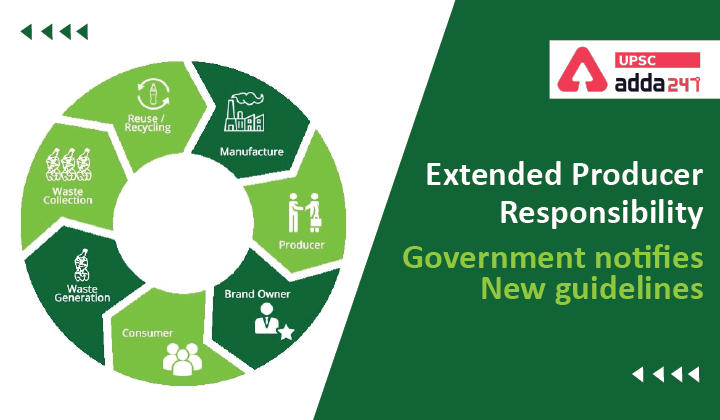Table of Contents
Extended Producer Responsibility: Relevance
- GS 3: Conservation, environmental pollution and degradation, environmental impact assessment.
Extended Producer Responsibility: Context
- Recently, Ministry of Environment, Forest and Climate Change has notified the guidelines on Extended Producers Responsibility on plastic packaging under Plastic Waste Management Rules, 2016.
Extended Producer Responsibility: Key points
- The guidelines on extended producer responsibility coupled with prohibition of identified single use plastic items, with effect from 1st July 2022, are important steps for reducing pollution caused due to littered plastic waste in the country.
- Single use plastics have low utility and high littering potential, and thus contribute significantly to the plastic pollution in the country.
- The guidelines will promote development of new alternatives to plastics and provide a roadmap for businesses to move towards sustainable plastic packaging.
- The guidelines not only provide a framework to strengthen the circular economy of plastic packaging waste, but also promote development of new alternatives to plastics.
Extended Producer Responsibility: Key guidelines
- The new rules classify plastics into four categories:
- Category 1 will include rigid plastic packaging;
- Category 2 will include flexible plastic packaging of single layer or multilayer (more than one layer with different types of plastic), plastic sheets and covers made of plastic sheet, carry bags, plastic sachet or pouches.
- Category 3 will include multi-layered plastic packaging (at least one layer of plastic and at least one layer of material other than plastic).
- Category 4 will include plastic sheet or like used for packaging as well as carry bags made of compostable plastics.
- According to the new rules, the producers, importers and brand-owners need to provide the details of recycling certificates only from registered recyclers along with the details of quantity sent for end-of-life disposal.
- A centralised online portal will be established by Central Pollution Control Board (CPCB) for the registration as well as filing of annual returns by producers, importers and brand-owners, plastic waste processors of plastic packaging waste.
- This online platform would reflect the plastic packaging material introduced in the market by them in a financial year.
- It shall also reflect the details regarding the audit of the producers, importers and brand-owners as well as recyclers or other waste processors of plastic packaging waste
- Environmental compensation shall be levied based upon polluter pays principle, with respect to non-fulfilment of EPR targets by producers, importers and brand owners.
- This compensation will be used for protecting and improving the quality of the environment and preventing, controlling and abating environment pollution.
- A committee shall be constituted by the CPCB under chairpersonship of CPCB chairman, to recommend measures to the environment ministry for effective implementation of EPR.
- Under the new guidelines, SPCBs shall submit annual report on EPR portal with respect to its fulfilment by producers, importers and brand and plastic waste processors in the state/Union Territory to the CPCB.
About EPR
- Extended Producer Responsibility is a legislative strategy used by most industrialised nations to promote chemical recycling of plastic waste.
- Globally, EPR is considered as the only viable strategy to prevent landfilling of plastic waste.
- EPR covers reuse, recycling, use of recycled plastic content and end of life disposal by producers, importers and brand-owners.
Plastic Waste Management Rules, 2016
- The Plastic Waste Management Rules, 2016, mandate the generators of plastic waste to take steps to minimise it, ensure its segregated storage at source and hand it over to local bodies or agencies.
- The rules prescribe Extended Producer Responsibility (EPR) for producer, importer and brand owner for collection and recycling of plastic packaging waste.
Also Read:





 TSPSC Group 1 Question Paper 2024, Downl...
TSPSC Group 1 Question Paper 2024, Downl...
 TSPSC Group 1 Answer key 2024 Out, Downl...
TSPSC Group 1 Answer key 2024 Out, Downl...
 UPSC Prelims 2024 Question Paper, Downlo...
UPSC Prelims 2024 Question Paper, Downlo...




